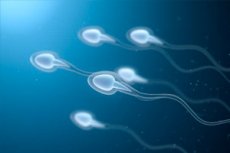
过去60年,世界人口增长了2.6倍多。这种增长态势仍在持续——预测显示,到2037年,人口将从2022年的80亿增至90亿。这些数字凸显了计划生育的必要性;然而,近几十年来,避孕技术方面的突破却寥寥无几。对于男性而言尤其如此,因为目前还没有研发出专门针对男性的口服避孕药。
在《科学》杂志上发表的一项研究中,贝勒医学院的研究人员及其同事在动物模型上证明,一种新的非激素、针对精子的方法为可逆的男性避孕提供了一种有希望的选择。
“尽管研究人员长期以来一直在研究男性避孕药,但我们仍然没有找到适合男性的避孕药,”该研究的主要作者、贝勒医学院药物研发中心主任兼病理学和免疫学系主任马丁·马苏克博士说。
“在这项研究中,我们专注于一种新方法——寻找一种可以抑制丝氨酸/苏氨酸激酶 33 (STK33) 的小分子,这种蛋白质对男性和小鼠的生育能力至关重要。”
先前的研究表明,STK33 在功能性精子的形成中起着关键作用。Stk33 基因被关闭的小鼠由于精子异常和精子活力低下而导致不育。在男性中,STK33 基因突变也会因同样的原因导致不育。重要的是,这些小鼠和男性没有其他缺陷,睾丸大小保持正常。
“STK33 似乎是男性避孕的一个有希望的目标,而且安全性问题极小,”Matsuk 表示,他在贝勒医学院工作了 30 年,担任过多个重要职位。
寻找强效的STK33抑制剂 “我们利用DNA编码化学(DEC-Tec)技术筛选了数十亿种化合物,并发现了强效的STK33抑制剂,”该研究的第一作者、Matsuka实验室的博士后研究员Angela Ku博士说道。“我们和其他团队已经利用这种方法发现了强效且具有选择性的激酶抑制剂。”
研究人员发现了一些有效的STK33抑制剂,并对其进行了改良,使其更加稳定、有效且选择性更高。“在这些改良版本中,CDD-2807是最有效的,”Ku补充道。
“我们随后在小鼠模型中测试了CDD-2807的疗效,”该研究的共同作者、Matsuk实验室的博士后研究员Courtney M. Sutton博士说道。“我们评估了多种剂量和治疗方案,然后测定了小鼠的精子活力和数量,以及它们使雌性受精的能力。”
CDD-2807 药物能够有效穿过血睾屏障,并在低剂量下降低小鼠的精子活力、精子数量和生育力。“我们很高兴地看到,小鼠在接受 CDD-2807 治疗后没有出现任何毒性迹象,药物也没有在脑内蓄积,而且这种治疗也没有像在 Stk33 基因敲除小鼠和 STK33 突变男性中那样改变睾丸大小,”Sutton 指出。
“重要的是,避孕效果是可逆的。停止使用CDD-2807后,小鼠的精子活力和数量得到恢复,并再次具有生育能力。”
“在我们的论文中,我们还展示了 STK33 的第一个晶体结构,”研究合著者、贝勒医学院生物化学和分子药理学副教授兼 Dan L. Duncan 综合癌症中心成员 Choel Kim 博士说。
“我们的晶体结构展示了我们的一种强效抑制剂如何在三维空间中与STK33激酶相互作用。这使我们能够建模和设计具有更佳药物特性的最终药物CDD-2807。”
“这项研究对我们贝勒药物研发中心的团队及其合作者来说是一个真正的突破,”该研究的共同作者、贝勒医学院病理学与免疫学、生物化学与分子药理学助理教授滕敏星博士说道。滕博士也是德克萨斯癌症研究所的科学家,以及贝勒大学丹·L·邓肯综合癌症中心的成员。
“通过从基因验证的避孕目标开始,我们能够证明 STK33 也是化学验证的避孕目标。”
Matsuk 总结道:“在未来几年,我们的目标是进一步评估这种 STK33 抑制剂和 CDD-2807 等化合物在灵长类动物中的作用,以确定它们作为可逆男性避孕药的功效。”

